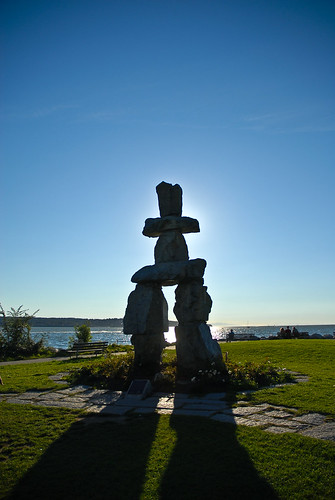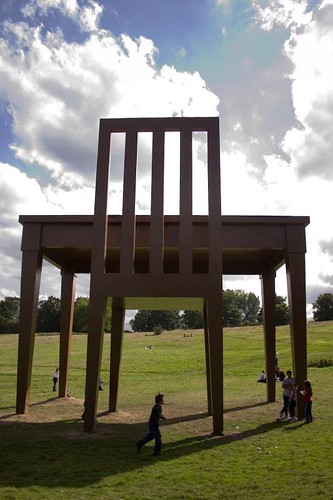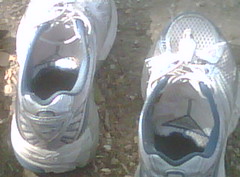 The Date: February 28, 2010. Canadians will remember it as the last day of the gold rush. Maybe that’s the song Neil Young should have played at the Closing Ceremonies. No, we’re not talking about the Klondike gold rush of 1896. This is the modern day Olympic gold rush. A record 14 gold medals in the Winter Olympics were mined by Canadians at the 2010 Olympics in Vancouver. Canada may not have “Owned The Podium”, but they sure did “Own The Gold”.
The Date: February 28, 2010. Canadians will remember it as the last day of the gold rush. Maybe that’s the song Neil Young should have played at the Closing Ceremonies. No, we’re not talking about the Klondike gold rush of 1896. This is the modern day Olympic gold rush. A record 14 gold medals in the Winter Olympics were mined by Canadians at the 2010 Olympics in Vancouver. Canada may not have “Owned The Podium”, but they sure did “Own The Gold”.
The final day of competition saw the Canadian men’s hockey team defeat the United States 3 – 2 in overtime. It was only fitting that the beloved hockey team would get the last gold to set the record. They won’t call it “Miracle On Ice”. That won’t be necessary, because to most Canadians, that hockey win wasn’t a miracle, it was more of a birthright. No, Canadians will call it “The Day The Country Stood Still And Breathed A Collective Sigh Of Relief” – or something similar. The movie title might have to be revised, of course. But hockey is only one part of this Olympic story – albeit a big one.
Why is all of this gold medal stuff so important to Canadians? Winning lots of medals is relatively commonplace in the United States. They won the most medals overall (37) at this Olympics. And besides, the stereotypical view of Canadians is the mild-mannered neighbors to the North that never utter a peep, always play second fiddle to the United States, and certainly don’t ever sound – nationalistic. Or proud. At least not in public. Oh, and they never talk about the War of 1812 – but that’s another story.
But as Bob Dylan once said, maybe the times they are a changin’.
 Thursday February 18 was a strange day in Austin. I had a client who was 30 minutes late for an appointment, telling me he thought there had been some kind of “big wreck” on one of the city’s major thoroughfares which had shut down traffic. That certainly isn’t something out of the ordinary in Austin. But as is turns out, it was a more than just a big wreck. Someone by the name of Joe Stack had crashed his plane into the side of a building. It was a sad, crazy day in Austin. An act of terror? Here? Really? Please, wake me up. Really?
Thursday February 18 was a strange day in Austin. I had a client who was 30 minutes late for an appointment, telling me he thought there had been some kind of “big wreck” on one of the city’s major thoroughfares which had shut down traffic. That certainly isn’t something out of the ordinary in Austin. But as is turns out, it was a more than just a big wreck. Someone by the name of Joe Stack had crashed his plane into the side of a building. It was a sad, crazy day in Austin. An act of terror? Here? Really? Please, wake me up. Really?
But is it “terrorism”? It seems like there are a lot of people debating the semantics of this. Why, I am not quite sure. Terrorism is, by definition, “The unlawful use or threatened use of force or violence by a person or an organized group against people or property with the intention of intimidating or coercing societies or governments, often for ideological or political reasons”. Terrorism knows very few bounds. It is a pretty broad definition.
You know that the issue of semantics (and fear) has grown to epic proportions when you have an Austin American-Statesman headline that reads “Was attack an act of terrorism, rage or spectacle murder”. We really need to categorize this? Really? Any act of violence like this will “intimidate or coerce societies or governments”, especially in their response to the tragedy. Can we not just leave it at that?
This goes far beyond an issue of semantics. It goes deep into our psyche, our beliefs, our values.
 The Olympics represent something special in the sports world. For all of the disputes related to performance enhancing drugs, figure skating “judges”, and the like, the Olympics represent a time when people come together in the spirit of competition. Wars don’t matter. Races and religions don’t matter. The Olympics bring the world together.
The Olympics represent something special in the sports world. For all of the disputes related to performance enhancing drugs, figure skating “judges”, and the like, the Olympics represent a time when people come together in the spirit of competition. Wars don’t matter. Races and religions don’t matter. The Olympics bring the world together.
There is nothing quite like the feeling you have when your athlete, your team, your nation, stands atop the highest level of the podium. When you hear the opening strains of your national anthem, it will always bring a tear to your eye, regardless of what country you were born in (and where home is now). You could be from the United States, or Croatia, or Australia – that sense of pride, that feeling of “home” – exists deep within each of us, almost to the core of our being.
In the three times that Canada has hosted the Olympics, they have not won a gold medal on their home soil. Through the 1976 Summer Olympics in Montreal, the 1988 Winter Olympics in Calgary, and now the 2010 Winter Olympics in Vancouver, Canada has yet to strike gold in their own backyard.
When I was growing up, Canadians were always a little shy about being overtly proud of their nationality. Unless it comes to hockey - our national pastime. But even the Canadian men’s hockey team had a 50 year gold medal drought at the Olympics until 2002. As a Canadian living in the United States, the Olympics are always an interesting psychosocial challenge. I am always reminded of the Canadian medal count, and how it compares to that of the United States. Our Olympics sport self-image has almost become a bit of a Canadian inferiority complex.
I think I really started to notice a collective change sometime around, well, 2002 – the year that the men’s hockey team ended their 50 year drought. When they won – the whole nation cheered. Loudly.
 The Live Music Capital of the World. You see it as soon as you fly into Austin Bergstrom International Airport. The City of Austin have been using this as their motto for quite some time now. I’ve never really doubted the truth in it. I discovered Austin because of the music. When I found out that there were more guitar players per capita in Austin than in any other place in the universe (my statistics), how could I not want to visit?
The Live Music Capital of the World. You see it as soon as you fly into Austin Bergstrom International Airport. The City of Austin have been using this as their motto for quite some time now. I’ve never really doubted the truth in it. I discovered Austin because of the music. When I found out that there were more guitar players per capita in Austin than in any other place in the universe (my statistics), how could I not want to visit?
After peeling away the layers upon layers of Austin guitar players, you then discover the vibe, the sound, the feel that is “Austin music”. It is a blend of many musical styles that has grown and evolved organically to create that unmistakable vibe. It’s Joe Ely, live at the Liberty Lunch. It’s Sarah Hickman or Lyle Lovett or David Garza at the Cactus. It’s Stevie Ray Vaughan at Antones. It’s Asleep At The Wheel at the Broken Spoke. Or how about the Arc Angels at the Opera House? Or Soul Hat at the Black Cat Lounge? Or Storyville at Stubbs?
Much of that “Austin sound” has been fostered by the laid-back music scene, where artists could come to play their music amongst others who would appreciate it, groove to it, and cultivate it. You came to Austin to play music in the presence of others who love music. My own personal experience as a musician was reflective of that.
But sadly, we are now faced with yet another Austin music landmark closing. With this week’s announcement of the closing of the Cactus Cafe, I am left to ponder the evolution – or perhaps devolution - of the Live Music Capital of the World.
 When I was in high school, I was a self-professed “math and science geek”. Well, perhaps I didn’t use the word “geek” as such, but my grades made it quite apparent that that was where my academic strengths were at the time. In contrast, English was my worst subject. English always consisted of reading books that someone told me were important or epic that usually ended up being irrelevant or downright boring. This always ended up in a litany of book reviews and reports.
When I was in high school, I was a self-professed “math and science geek”. Well, perhaps I didn’t use the word “geek” as such, but my grades made it quite apparent that that was where my academic strengths were at the time. In contrast, English was my worst subject. English always consisted of reading books that someone told me were important or epic that usually ended up being irrelevant or downright boring. This always ended up in a litany of book reviews and reports.
And then there was my senior year – and the much-dreaded Canadian literature class.
At the time, I was convinced that “Canadian literature” was a bit of a misnomer. As a high school senior with an interest in calculus and physics, it was hard to fathom many Canadian authors worth studying. But it was in this same class that we were given an assignment to either write a book review of a Canadian author of your choice, or to select a Canadian musician and review their lyrical content. Suddenly, writing had some degree of personal relevance. This got me to explore my thoughts on issues relevant to my world, and to do so on the written page. I discovered that the writing process was, well, almost enjoyable.
I can’t say that I started off writing because it was something that I felt a natural talent or inclination to do. But now, I am thankful that it is a part of my daily world. So now I am left to ask – why do I write?
 There are too many distractions in our world that readily assail us at any juncture. Whether it’s work, or life, or relationships, or family, or any combination, it’s easy to get caught up in the “stuff”. Suddenly, stuff drives your day. And as they say, don’t sweat the small stuff, right? Well, a lot of stuff suddenly makes your day full of cognitive stress.
There are too many distractions in our world that readily assail us at any juncture. Whether it’s work, or life, or relationships, or family, or any combination, it’s easy to get caught up in the “stuff”. Suddenly, stuff drives your day. And as they say, don’t sweat the small stuff, right? Well, a lot of stuff suddenly makes your day full of cognitive stress. It is no small wonder that I don’t run with an iPod or mp3 player, simply because I find this to be a great time to get away from all the distractions of daily life. The peacefulness of hearing my feet strike the ground, my breathing, and then, my thoughts. And then – the moment. That precious moment. And another. And another. It’s almost like a string of pearls – each moment beautiful of it’s own accord, strung together one by one. A time when all stands still, when stuff just doesn’t matter, but the moment does.
Today’s 3M half marathon was a great reminder of how running provides us not only with an environment in which to "let go”, but also a metaphor for life as we know it. This metaphor also stands to remind us of how we err in daily life, and how we can excel.
Even when you know that stuff happens, that distractions rule your existence, it’s a challenge to rectify it. It is so hard to simply “be in the moment” and to let go of our attachment to emotions, drama, angst, anger, frustration, discontent, and a plethora of unpleasant stuff. And let’s face it – can you be self-actualized when you are chasing stuff around all day?
 As of today’s Supreme Court decision, we have an even greater mess brewing in our electoral process. In the Citizens United vs. Federal Election Commission decision, the Supreme Court put up a hockey score vote of 5 – 4 to remove limits on corporate campaign spending. If we didn’t already have enough money being thrown at politicians to bend their ears on issues from immigration to health care to abortion, we now have even more.
As of today’s Supreme Court decision, we have an even greater mess brewing in our electoral process. In the Citizens United vs. Federal Election Commission decision, the Supreme Court put up a hockey score vote of 5 – 4 to remove limits on corporate campaign spending. If we didn’t already have enough money being thrown at politicians to bend their ears on issues from immigration to health care to abortion, we now have even more. In the decision, it was stated by Justice Anthony Kennedy that “"when government seeks to use its full power, including the criminal law, to command where a person may get his or her information or what distrusted source he or she may not hear, it uses censorship to control thought.”
I didn’t just read this, did I? Imagine, if you will, Corporation A (or Special Interest Z) with big budget, seeking support from Legislator B, “offering” to produce ads etc denouncing Legislator C, in return for “consideration” of their “policy suggestions”.
Hold on a second. I respectfully disagree with the Supreme Court decision. Fortunately, my First Amendment rights allow me to do so. Whew. Something about this whole thing just doesn’t make sense. A 100-year-old policy – gone – as quickly as it takes to say “Holy Campaign Finance Reform, Batman”.
 "Running Injuries: Etiology And Recovery- Based Treatment" (co-author Bridget Clark, PT) appears in the third edition and fourth editions of "Clinical Orthopaedic Rehabilitation: A Team Approach" by Charles Giangarra, MD and Robert C. Manske, PT.
"Running Injuries: Etiology And Recovery- Based Treatment" (co-author Bridget Clark, PT) appears in the third edition and fourth editions of "Clinical Orthopaedic Rehabilitation: A Team Approach" by Charles Giangarra, MD and Robert C. Manske, PT.
 Allan Besselink, PT, DPT, Ph.D., Dip.MDT has a unique voice in the world of sports, education, and health care. Read more about Allan here.
Allan Besselink, PT, DPT, Ph.D., Dip.MDT has a unique voice in the world of sports, education, and health care. Read more about Allan here.
 Top 5 finalist in three categories: "Best Overall Blog", "Best PT Blog" and "Best Advocacy Blog".
Top 5 finalist in three categories: "Best Overall Blog", "Best PT Blog" and "Best Advocacy Blog".